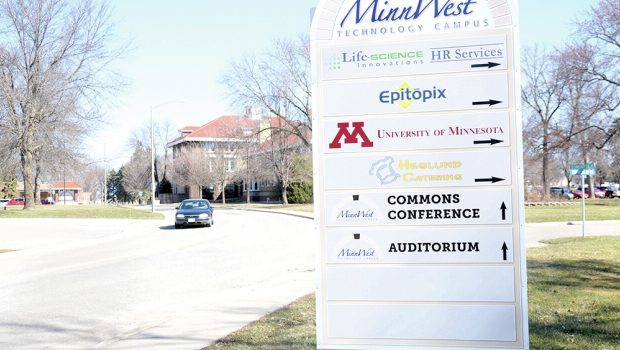City of Willmar follows county’s lead for latest MinnWest Technology Campus tax abatement – West Central Tribune
WILLMAR
— The City of Willmar followed Kandiyohi County’s lead when granting property tax abatement on a sliding scale to the
.
MinnWest was requesting from the city 100% abatement of property taxes on the increased value of the property over 10 years, as it had done with the county, for a project to renovate and improve three additional buildings on the campus. The estimated completed market value is $4,802,200, according to the resolution approved by the Willmar City Council.
The city approved a 10-year abatement that will total approximately $97,462. The 100% abatement over 10 years would have totaled approximately $133,509, a difference of $36,047.
An abatement allows the increased property taxes that a property owner would pay on the improvements to the property, over a set period of time, to be directed toward development costs.
The city will continue to collect the 2021-2022 base tax capacity on the three additional buildings, approximately $61,000, but the increased taxes from upgrading the buildings will be abated for a decade on a sliding scale.
Despite approving the sliding scale abatement, several council members spoke in favor of MinnWest following the public hearing on June 6, sharing their sentiment that the council would have approved 100% abatement if they had been approached before the county was.
“I would say if you came to the city first, you probably would have gotten the full value,” said Councilor Rick Fagerlie, noting that council members are not experts in certain areas and tend to follow staff recommendations.
The Kandiyohi County Board in January approved what commissioners described as a 10-year "step-down" abatement, reducing the amount of taxes abated as the years pass. The county abatement will total approximately $139,424.
“I did not watch the county’s meeting, so I did not know their reasoning or their justification for the step process,” said Councilor Andrew Plowman.
The city matched what the county did. Starting at 100% in years 1 to 4, the portion of taxes from the increased value of the property abated by the city diminishes to 70% in years 5 to 7 and 40% in years 8 to 10. The abatement will run from 2024 through 2033.
“When we are talking this dollar amount over this amount of time, I don’t feel as though the initial request by the originating party is out of line," Plowman said. "Especially when we’re taking a look at the type of business and the amount of work and the impact that they have had to date in our community, especially on an industrial level.”
In return for the tax abatement, MinnWest agrees to generate 75 new jobs from campus tenants in the next 10 years and invest $2 million into capital improvements. It will also use local labor and trades for the capital improvements.
Councilor Vicki Davis agreed with Plowman, adding, “I feel that MinnWest has put so much into our community, and our community would not be the same place without it.”
When city staff was asked why its recommendation was to grant a sliding scale abatement, Willmar Planning and Development Director Justice Walker explained that, aside from MinnWest, others granted abatement have not been able to start paying their taxes when the abatement deals came to an end.
He also said that it is unclear that all the employees that work at MinnWest actually come to work in Willmar with the ability to work remotely.
Mayor Marv Calvin agreed with the council members, and praised MinnWest for the benefits it has brought to Willmar and Kandiyohi County, noting the work a lot of people put in to make it happen.
“You’re appreciated in Willmar, you are appreciated a lot,” Calvin said.
During the public hearing, Jim Siebens shared the history of MinnWest, stating that it was in 2005 when the idea of purchasing the campus of the former Willmar Regional Treatment Center from the state of Minnesota and converting it into a technology campus came about.
“There was an enormous amount of collaboration to allow that to happen,” he said. “It was across the boards, from the chamber, from the city, from the county and school district. There were a lot of things that transpired to actually allow this to happen. We have had this partnership going for many, many years. It’s a wonderful partnership in the goals of building a campus out here that brings technology-based companies to campus.”
While the campus has continued to grow and expand, its owners, NovaTech Engineering and Life-Science Innovations, have continued to subsidize the campus throughout the years. The net subsidies since the inception of the campus total $3.2 million, according to Siebens. The total investment in infrastructure improvements on the campus is $22 million, he said.
The buildings being updated and renovated on the campus of the former state hospital were built beginning in 1907 in the Spanish colonial architectural style, and it is something that has been preserved throughout renovations.
Phase one of the renovations took place from 2006 to 2008 with a $6.35 million investment. Amenities added to the campus during that time frame included a data center and cafeteria. There were 12 business tenants on campus employing 200 people full-time.
Phase two took place from 2009 to 2011 with a $4 million investment. Added amenities included an on-campus daycare. There were then 28 business tenants and 328 full-time employees.
Phase three took place from 2012 to 2014 with a $5 million investment. Added amenities during that phase included an auditorium, cafeteria, and meeting spaces. The campus then had 40 business tenants and 450 full-time employees.
Phase four took place from 2015 to 2020 with an estimated investment of $8.1 million. During this phase, the cafeteria was improved and conference rooms added. There were 27 business tenants and 693 full-time employees on the campus.
As of February 2022, there were 30 tenants and 819 full-time jobs.








Gloss